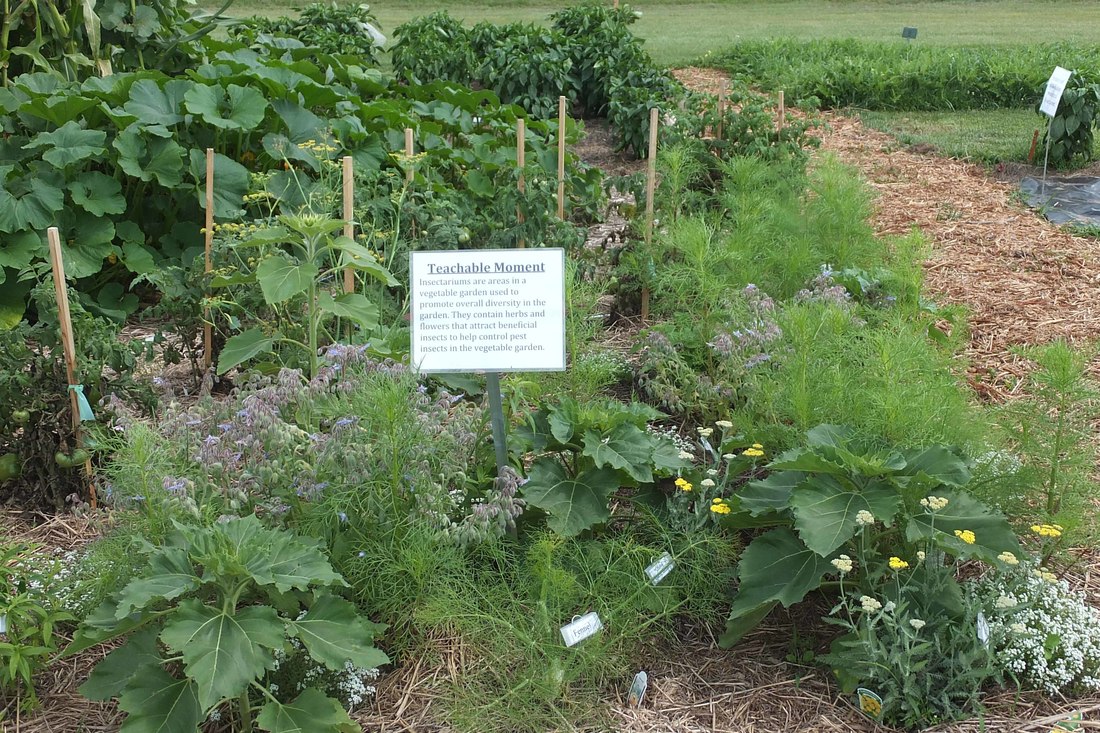 The idea of an insectary is that certain plants contain properties that either invite beneficial insects or repel harmful insects. Beneficial insects prey on pests that cause damage in the garden. Ladybugs and praying mantis are good examples of beneficials. Using plants for pest control not only cuts down on your workload, but it also reduces the amount of insecticides that you use in your garden. And fewer insecticides means more good bugs, which in turn means help in controlling bad bugs. Here are a few excellent choices for your garden:
• Lemon Balm: Lemon balm is valued as a culinary, cosmetic and medicinal herb. Use fresh sprigs to top drinks and as garnishes on salads and main dishes. The fresh or dried leaves make a great cold or hot tea, and the dried leaves can be used pot-pourris. Traditionally valued as a medicinal herb, lemon balm has mild sedative properties. Lemon balm is easy to grow from seed sown in the spring or early fall. • White Alyssum: This fragrant garden favorite produces masses of crisp white blooms Perfect choice for lining walkways or in window boxes. This annual attracts Hoverflies, Lacewings and Tachnid flies. Alyssum is deer resistant and tolerates partial shade. • Fennel: Use fresh fennel leaves in salads or with eggs, fish and sauces. The bulbous stem can be steamed, grilled or served raw; it's like celery with a delicate anise aroma. It has many medicinal properties. Likes full sun and mild to cool weather. Start outside after danger of frost. • Dill: Dill attracts hoverflies and predatory wasps (good guys), and swallowtail butterfly caterpillars use its foliage as food. Tomato hornworms are also attracted to dill, so if you plant it at a distance, you can help draw these destructive insects away from your tomatoes. Dill repels aphids and spider mites. Try sprinkling dill leaves on your squash plant to repel squash bugs. But be forewarned: Dill re-seeds with a vengeance and takes over the garden in a hurry, so you need to cut the seed heads before they ripen. • Parsley: A high-yielding, very large and vigorous herb. This herb's dark green leaves have a beautiful, ferny appearance, and they grow in mounded clumps that look especially attractive along a border. Parsley leaves are rich in vitamins and minerals. Also can be used as filler in floral bouquets. • Cosmos: Excellent eye-catching border plant, and in pots and bouquets. Cosmos require little fertility or care, making them great for beginner gardeners. Attracts Hoverflies, Parasitic Wasps and Lacewings. Cosmos are great source of nectar and pollen for beneficial insects. • Borage: This plant is a real workhorse in the garden. It repels tomato hornworms and cabbage worms and attracts beneficial bees and wasps. Borage also adds trace elements to the soil. This is an annual, but readily comes back each year from seed. • Sunflower: Attracts beneficial Pirate Bugs, Aphidius and Parasitic Wasps. Use sunflowers as a way to draw aphids away from other plants. Ants will move their colonies on to sunflowers. The sunflowers are tough enough that they suffer no damage. However, if you have friendly neighborhood deer, they find sunflower sprouts quite tasty. • Achillea: An all-time favorite for the sunny border. Tall, flat clusters of delicate flowers are outstanding as dried cuts, with stiff stems and persistent color. Start indoors 8 weeks before last frost. Achillea is tolerant to drought and butterfly friendly. Attracts beneficial insects like Lacewings, Aphidius and Ladybugs • Lemon Verbena: A plant for every garden space. Give this herb soil with good drainage and watch it take off. Lemon Verbena has a delightful lemon fragrance. This is an easy, low maintenance plant. Does well in containers. Adapted from Spooner Research Teaching & Display Garden – 2017 Virtual Garden Book https://www.northcountrymgv.org/uploads/6/9/3/7/69377869/2017_virtual_tour_garden_book.pdf
0 Comments
Leave a Reply. |
|
| North Country MGV | gARDEN bLOGS |
Location |
|
 RSS Feed
RSS Feed